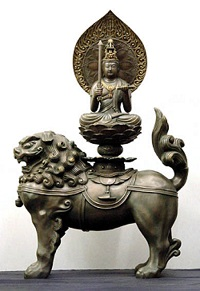The Sixteen Buddhist Precepts
The sixteen Precepts are an integral part of the Buddhist life. They embody the attitude of mind and heart that enables one to live fully in the world in a way that benefits oneself and others. Breaking them does not condemn you to eternal damnation; it does break your heart. As Rev. Master Koshin said in a dharma talk, "The true wish to follow the Precepts throws you right back on what the real spirit of the Precepts is, which is reharmonizing with the Eternal: the wish, the longing, the intention, the resolve to be true to one's own heart."1
On first reading, the Precepts may seem obvious. With meditation, however, one begins to realize how deep and subtle they truly are, and that their implications reach into every aspect and dimension of life. Exploring these aspects and dimensions is the work—and the adventure—of a lifetime.
The central importance of the Precepts is underscored by the fact that publicly accepting—and vowing to keep—the Precepts is one of the ceremonies one participates in if one chooses to formally become a Buddhist.2 And, if one becomes a monk, the the Precepts are taken again at ordination and yet again at the time of Dharma Transmission.
The basic outline of the sixteen Precepts is included below. Rev. Master Jiyu-Kennett wrote a commentary on the Precepts as they are formally taken that conveys their richness and depth. Click here to display that commentary. 3
The Three Refuges
I take Refuge in the Buddha
Not only the historical Buddha, Shakyamuni, but also the Buddha Nature inherent in all beings.
I take Refuge in the Dharma
Not only the teachings of Shakyamuni Buddha, but also the Truths we realize when we truly listen to our True Heart, our Buddha Nature, the "still, small voice."
I take Refuge in the Sangha
The monastic community in particular, and all those who strive to live the Buddhist Precepts.
The Three Pure Precepts
Cease from Evil
Do Only Good
Do Good for Others
The Ten Great Precepts
Do not kill
Do not steal
Do not covet
Do not say that which is not true
Do not sell the wine of delusion
Do not speak against others
Do not be proud of yourself and devalue others
Do not be mean in giving either Dharma or wealth
Do not be angry
Do not defame the Three Treasures of Buddha, Dharma and Sangha
1. Rev. Master Koshin Schomberg, Talk 9 in series of dharma talks on Rev. Master Jiyu Kennett's How to Grow a Lotus Blossom. ⇑
2. One can participate indefinitely in the activities of a temple without formally "becoming a Buddhist." And, it is normal for many people, if they become dedicated to the training and it speaks to their heart, to do so. ⇑
3. The Kyojukaimon and Commentary is a PDF file provided by Shasta Abbey Buddhist Monastery's website, shastaabbey.org . ⇑



